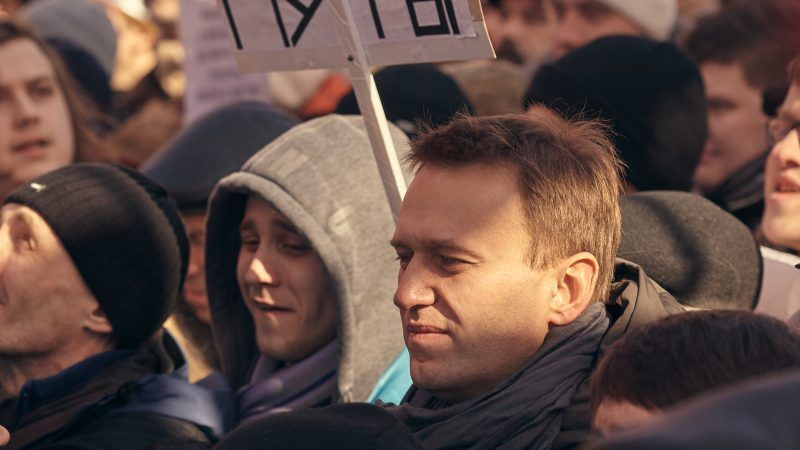Putin Opponent Navalny Arrested, Faces More Than 3 Years in Prison
The political activist's fraud conviction has been called a "politically motivated" Kremlin plot to keep him from running for office.

Russian opposition leader Alexei Navalny was arrested Sunday in Moscow for violating probation for a 2014 fraud conviction. Why had he missed his meetings with probation officials? He was in Germany recovering from a Kremlin-linked nerve agent attack.
On Monday, a judge in the city of Khimki ordered Navalny detained for 30 days to await trial. Navalny, who was convicted of embezzling 16 million rubles' ($500,000) worth of lumber from a state firm, faces over three years in prison. The European Court of Human Rights has declared Navalny's original conviction to have been politically motivated, and his supporters say it was to prevent him from running for president against Vladimir Putin in 2018.
Navalny, who emerged on the Russian political scene over a decade ago as a financial analyst investigating state corruption, represents the only legitimate opposition to Putin's regime, says Chris Miller, director of the Foreign Policy Research Institute's Eurasia Program.
"In the Russian political system there is fake opposition," Miller tells Reason. "There are four parties in the Russian parliament. Three of them are ostensibly opposition but in reality, they are controlled, to varying degrees, by the Kremlin."
According to Miller, political outsiders like Navalny are barred from appearing on traditional media sources because they are controlled by the government. Nonetheless, Navalny has found success in reaching an audience. He made a surprisingly strong run for mayor of Moscow in 2013 and his YouTube videos denouncing Russia's widespread corruption have garnered millions of views.
In a video recorded from the police station where he was being tried, Navalny said that he had been denied a meeting with his attorney and called the proceedings "lawlessness of the highest order."
"Why is a hearing of the Khimki court being held at the police station?" Navalny asked. "Why was no one informed? Why was I not given a summons?"
The Russian government has been levying trumped-up charges against Navalny for years, according to Miller.
"In the past, many of them have been incoherent, many have bent the rules of what the Russian law actually allows," Miller says. "It's quite clear that the government, who otherwise has not shown great respect for the rule of law, is willing to do anything to keep him out of politics."
Leaders from around the world have denounced Navalny's arrest. The United States, United Kingdom, and European Union have demanded his immediate release, while Estonia, Latvia, and Lithuania have openly called for sanctions.
On Tuesday, the Kremlin dismissed this international pressure. "It's a completely internal affair," said Dmitry Peskov, spokesman for President Putin. "We have no intention of listening to these statements."


Show Comments (42)